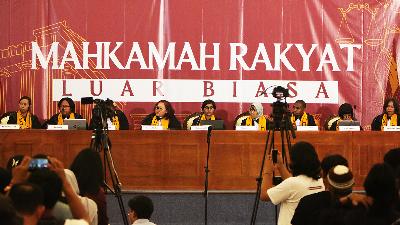The Impacts of Karen Agustiawan's Sentence on the Business Decisions of SOE Directors
Monday, July 1, 2024
The guilty verdict for Karen Agustiawan shows that in Indonesia, even business decisions can easily lead to prosecution. This will have a long-term negative impact on our economy.
arsip tempo : 174384511465.

THE nine-year jail sentence handed down to former Chief Executive Officer (CEO) of Pertamina, Galaila Karen Kardinah, alias Karen Agustiawan, shows how, in Indonesia, business decisions can easily lead to prosecution. This verdict will make directors of all state-owned enterprises nervous. The threat of prosecution hangs over the business risks that they take.
Karen was sentenced to nine years in jail and fined Rp500 million by the Jakarta Corruption Court on Monday, June 25. The judges took the view that the 2009-2014 Pertamina CEO had caused losses to the state, totaling US$113.83 million (around Rp1.83 trillion) from the supply of liquefied natural gas from Corpus Christi Liquefaction between 2011 and 2021.
This case began with the agreement between Pertamina and Corpus Christi Liquefaction from the United States in 2023 to import LNG for a period of 20 years. At the time, the crisis in gas supplies was making things difficult for industry. The government gave Pertamina a mandate to meet the domestic demand for gas through imports. The problem is that when supplies of gas started arriving from Corpus in 2019, the domestic demand for gas was already being met. As a result, Pertamina sold the imported gas at a low price, thereby making a loss.
The question is, was this loss an indication of corruption, or simply a business risk? When considering their verdict, the judges decided that Karen did not enjoy the proceeds of corruption. This should have at the very least indicated there was no ill-intention or mens rea on the part of Karen.
This case will certainly ring alarm bells for senior SOE management staff when taking decisions. SOE managers who make mistakes in business calculations that results in losses for the company could be jailed. These concerns will make SOE directors reluctant to take risks, despite risks always being present in every business. This reluctance on the part of SOE directors to take risks could clearly have a long-term impact. The growth of state-owned companies could stall, and as a result, national economic growth could grind to a halt.
All of this could have been avoided if law enforcement officers had used the business judgment rule (BJR) doctrine. This business evaluation method provides legal guarantees for company directors, including those of SOE’s, to take decisions carefully even if they eventually result in losses. This means that business decisions cannot be the subject of prosecution if they have been taken in line with the principles of caution and are based on good intentions. The indicators are the absence of fraud, conflicts of interest, illegal actions or intentional wrongdoing.
Indonesia adopted the BJR doctrine in Law No. 40/2007 on Limited Liability Company. It is this doctrine that led to Karen being acquitted in another case in March 2020. In the alleged embezzlement of investment in the Basker Manta Gummy Block, the Supreme Court found that Karen’s actions were not a crime, but simply a business decision.
As well as this, the prosecution of business decisions could easily be a means of attacking political opponents. SOE directors that disagree with politicians in power could easily be prosecuted on charges of making wrong business decisions. Things would become even worse.











